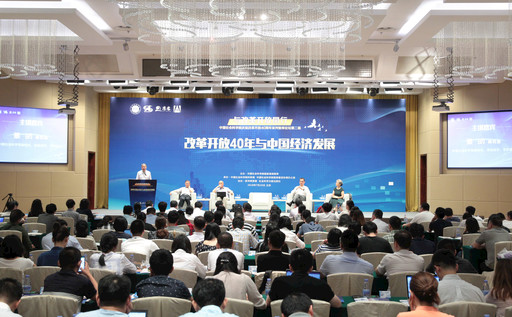
On July 24, the second session of the serial think tank forum celebrating 40 years of China’s reform and opening up was held in Beijing by the Chinese Academy of Social Sciences. The theme was “Forty Years’ Reform and Opening Up and China’s Economic Development.” Photo: Zhu Gaolei/CSST
On July 24, the second session of the serial think tank forum celebrating 40 years of China’s reform and opening up was held in Beijing by the Chinese Academy of Social Sciences (CASS). The theme was “Forty Years’ Reform and Opening Up and China’s Economic Development.” Lü Zheng, deputy director of the Academic Division of Economics and former director of the Institute of Industrial Economics under CASS, presided over the forum.
Cai Fang, vice president of CASS, attended the forum and delivered a keynote speech titled “Significance of China’s Growth Miracle for the World.” Cai said that in the past 40 years, China’s economic achievements were remarkable, attracting the world’s attention, and the improvement of people’s lives was unprecedented. This can be called a miracle in the history of world development. The necessary condition for China’s economic growth has been its demographic dividend and the sufficient condition has been the re-allocation of resources made possible by reform and opening up, turning the dividend into various elements for growth.
However, Cai also said, China’s working-age population began to decrease after peaking in 2010, a signal that the demographic dividend no longer exists. In the future, to sustain economic growth, China must shift its reliance on demographic dividend to reform dividend. For example, relaxing restrictions on the household registration (hukou) system to facilitate labor flow from rural to urban areas.
Lin Yifu, a professor from Peking University, gave another keynote speech titled “Forty Years’ Reform and Opening Up and Reflection on Modern Economics.” Lin said the application of theories depends on their prerequisites. Currently, the mainstream economic theories all originate from developed countries, consciously or unconsciously setting developed economies’ conditions as prerequisites.
As the development prerequisites for developed and developing economies differ, Lin said, the direct transfer of theories into developing nations will inevitably meet problems. Therefore, China must summarize its own experiences and form its own theories based on the conditions as an emerging economy, which could also provide reference for other developing countries.
Zhang Xiaoshan, a CASS Member and former director of the Rural Development Research Institute under CASS, made a speech in comment. Zhang said that in the next decade, how rural land capital is distributed will have a great impact on the process of urban-rural integration. Therefore, land reform is crucial to the broader strategy of deepening rural reform and coordinating rural-urban development.
The process of farmers acquiring land property rights is the process of land gradually getting marketized, Zhang added. Making it easier for people moving from rural to urban areas to be entitled to permanent urban residency is part of the same process, in which the social and economic development between rural and urban areas will be integrated. Allowing farmers to share in the benefits of land reform is essential to China’s economic growth in the future.
(Edited and translated by Shao Yijia)
Add: #5 Jianguomennei Street, Beijing, 100732,P.R.China
Copyright by CASS. All Rights Reserved

